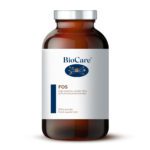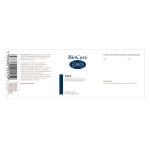




FOS Powder 250g BioCare
£11.80 Original price was: £11.80.£9.45Current price is: £9.45.
FOS Powder
BioCare FOS (Fructooligosaccharides) are a type of naturally occurring carbohydrate compound known as oligosaccharides. They are found in a variety of plants, including fruits, vegetables, and grains. F O S have gained attention for their potential health benefits, particularly for their role as prebiotics in the gut. Here are some key points about fructooligosaccharides:
**1. Chemical Structure:** F O S are composed of a short chain of fructose molecules linked together, typically with a glucose molecule at the end. The length of the chain can vary, but it typically consists of 2 to 9 fructose units.
**2. Prebiotic Properties:** F O S are considered prebiotics, which means they serve as a food source for beneficial gut bacteria, primarily in the colon. When consumed, they reach the colon undigested and are fermented by these bacteria. This fermentation process produces short-chain fatty acids (SCFAs) like butyrate, which can have various health benefits.
**3. Gut Health:** F O S can promote a healthy gut microbiome by selectively nourishing beneficial bacteria, such as Bifidobacterium and Lactobacillus. This can help maintain a balanced gut flora and support digestive health.
**4. Potential Health Benefits:** Consuming F O S or foods rich in FOS has been associated with several potential health benefits, including:
– Improved gut regularity and reduced risk of constipation.
– Enhanced calcium absorption, which may contribute to bone health.
– Support for the immune system, as a healthy gut microbiome plays a role in immune function.
– Possible benefits in managing blood sugar levels and promoting weight management, although research in these areas is ongoing.
**5. Dietary Sources:** F O S are naturally present in various foods, including:
– Vegetables: Jerusalem artichokes, onions, leeks, garlic, asparagus, and chicory root are some of the richest sources.
– Fruits: Bananas, plantains, and certain citrus fruits contain smaller amounts of F O S.
– Grains: Some whole grains, such as wheat and barley, contain FOS in lower concentrations.
**6. Supplements:** F O S are also available in supplement form, often as a powder or capsule. These supplements may be taken to support gut health, but it’s essential to follow the dosing instructions and consult with a healthcare provider if necessary.
**7. Caution:** While FOS can offer various health benefits, excessive consumption can lead to gastrointestinal discomfort, including gas and bloating. It’s best to start with smaller amounts and gradually increase intake to allow your gut microbiome to adjust.
In summary, fructooligosaccharides are naturally occurring carbohydrates found in various plant foods. They serve as prebiotics by nourishing beneficial gut bacteria and can have several potential health benefits related to gut health, digestion, bone health, and immune function.
As with any dietary component, it’s essential to consume FOS as part of a balanced diet, and if you have specific health concerns or dietary restrictions, consult with a healthcare provider or registered dietitian for personalized guidance.
A high potency soluble fibre as fructooligosaccharides , derived from chicory, for healthy balance of beneficial bacteria and gut function.
Fructooligosaccharides (FOS) are make out of short fructose chains. They are a sort of carb called oligosaccharides. FOS happen normally in many plants, which include
Fructooligosaccharides are subtly sweet and low-calorie. They are nondigestible, so they don’t have an effect on blood sugar levels. FOS may also have multiple health benefits.
Fructooligosaccharides Uses
FOS are utilize fundamentally as a low-calorie, elective sugar. Individuals can eat and drink items made with FOS rather than those containing sugar, which spike glucose levels in the blood, and cause weight gain. FOS may likewise be desirable over fake sugars, some of which have been connected to everything from weight gain, to diabetes.
Potential health benefits
FOS may have health benefits that provide value apart from their ability to sweeten food.
They’re prebiotic
Because they are not digestible, FOS travels intact through the small intestine to the colon (large intestine), where they support the growth of healthy bacteria in the digestive tract.
May protect against unhealthy bacteria
As reported in Digestive and Liver Disease, FOS helps suppress Clostridium perfringens, a toxic bacteria associated with food poisoning. One animal study reported in The Journal of Nutrition indicated that FOS may also provide some protection against salmonella, another food-borne illness.

















Reviews
There are no reviews yet.